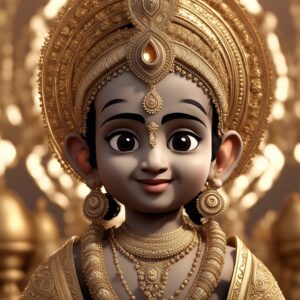As a child, Celebrating Janmashtami by visiting the local temple late night to offer prayers and participate in the rituals, was turly memorable. I recall being captivated by the vibrant decorations and the exquisite idol of Lord Krishna resting in the cradle, tenderly guarded by devotees as if, he were their own child followed by prasad distribution.
My appreciation for the festival grew even stronger as I embraced fatherhood. With this new perspective, I began to grasp the profound significance of Lord Krishna’s teachings and their enduring influence on Indian culture and Sanatan Dharma practice. It dawned on me that Janmashtami isn’t solely a celebration of a religious figure but a testament to the enduring principles of love, compassion, and selflessness that Lord Krishna exemplified.
Janmashtami, also known as Krishna Janmashtami, is a Hindu festival that celebrates the birth of Lord Krishna. It is observed on the eighth day of the dark fortnight in the month of Shravana, which usually falls in August or September. This festival is celebrated with great enthusiasm and devotion by Hindus all over the world, especially in India. In this blog post, I will share my prospective of Janmashtami and how it is celebrated, along with my personal experience of excitement to celebrate this festival.
Significance of Janmashtami
According to Hindu mythology, Lord Krishna was born in Mathura, a city in northern India, around 3200 BCE. He was born to Devaki, who was imprisoned by her brother King Kamsa. Krishna was born in a prison cell, and it is believed that upon his birth, the guards heard a voice declaring that the child was the incarnation of Lord Vishnu. The king Kansa (Maternal Uncle: Mama), fearing that the child would one day overthrow him, ordered the execution of all male children born in the city that night. However, Krishna was miraculously saved by his father Vasudeva, who took him across the Yamuna River to safety.
Janmashtami, commemorates the birth of Lord Krishna and is considered a significant event in Hinduism. Lord Krishna is revered as the embodiment of love, compassion, and divine joy. His teachings in the Bhagavad Gita, a sacred Hindu text, are considered a guide to living a spiritual life.
Celebrations of Janmashtami
Janmashtami is celebrated with great fervor and excitement. On this day, devotees of Lord Krishna observe fasts, offer prayers, and engage in various rituals. Temples dedicated to Lord Krishna are decorated with flowers, flags, and lights. People gather at temples to listen to sermons and discourses on the teachings of Lord Krishna.
One of the most popular traditions associated with Janmashtami is the enactment of the birth of Lord Krishna. This is done by placing a baby boy in a cradle, symbolizing the infant Krishna. Devotees then rock the cradle and sing devotional songs, recreating the scene of Lord Krishna’s birth.
Another important tradition during Janmashtami is the practice of Dahi Handi. This involves breaking a pot filled with yogurt and butter, which is tied high above the ground. This activity symbolizes the mischievous nature of Lord Krishna, who was known for stealing butter from his neighbors. Teams of young men form human pyramids to reach the pot and break it, while crowds cheer and chant.
Teaching of Lord Krishna
Throughout my college years and beyond, I consistently embraced one of Lord Krishna’s teaching, which he elucidates in Chapter 2, Verse 47 of the Bhagavad-Gita, regarding the concept of Karma.
कर्मण्येवाधिकारस्ते मा फलेषु कदाचन |
मा कर्मफलहेतुर्भूर्मा ते सङ्गोऽस्त्वकर्मणि || 47 ||
karmaṇy-evādhikāras te mā phaleṣhu kadāchana
mā karma-phala-hetur bhūr mā te saṅgo ’stvakarmaṇi
Meaning : Do your duty and be detached from its outcome, do not be driven by the end product, enjoy the process of getting there.
As I celebrate Janmashtami this year, with India playing host to G20 nations, I wish for peace and happiness to spread across India and the entire world. May the timeless wisdom of Lord Krishna’s teachings inspire people to harmoniously coexist with one another and the world around us. The happiness and affection associated with this festival unite people and foster harmony and comprehension among them. Through its various traditions and practices, this festival reminds us of the importance of love, compassion, and spirituality in our lives.
#AskDushyant




Leave a Reply